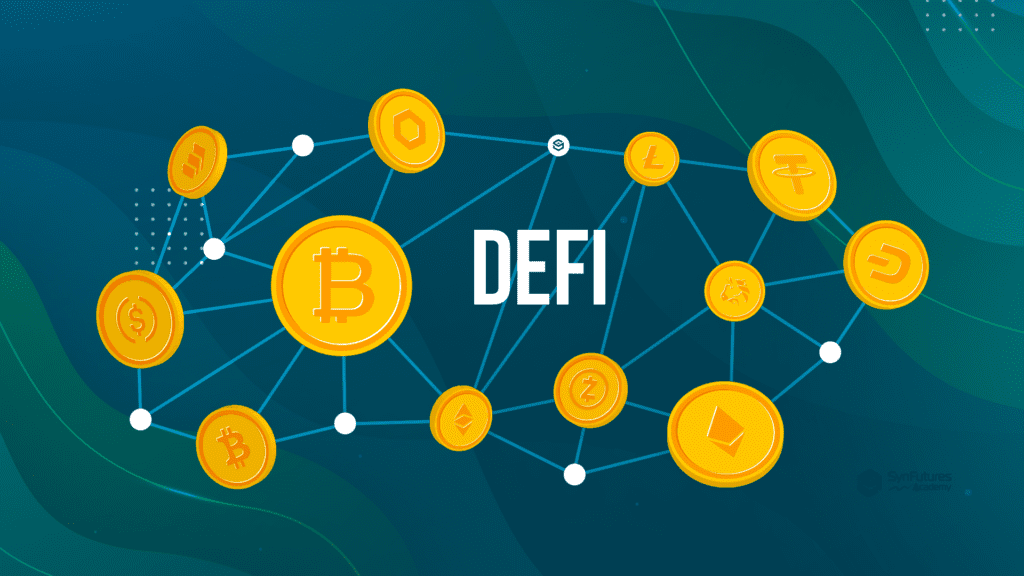Why Startups Should Choose DeFi Exchange Development?

Decentralized Finance (DeFi) is a disruptive trend in the blockchain and web3 space, and the impact of DeFi exchange development for startups has become a significant topic of discussion in the business world. DeFi has introduced new possibilities for accessing financial services through blockchain technology. As the adoption of decentralized finance continues to grow, it has the potential to revolutionize financial transactions for millions of businesses worldwide. But why should startups specifically choose DeFi exchange development? This post provides a detailed overview of how DeFi exchange development can support startups.
Does DeFi Make a Difference for Startups?

DeFi exchange development offers numerous benefits for startups. By integrating DeFi into their operations, startups can gain the trust of customers by providing decentralized and secure access to services. Customers are more likely to trust startups with DeFi integration, as it demonstrates adaptability to new trends and offers transparency and accuracy in record-keeping. DeFi also provides lower transaction fees, faster transfers, and better customer satisfaction, leading to improved customer loyalty.
The gradual adoption of cryptocurrencies in mainstream payments and the assurance of better security than centralized exchanges make DeFi exchanges a popular choice among users. Beyond these benefits, startups can explore different use cases and business opportunities with DeFi exchange development.
Fundamentals of a DeFi Exchange

DeFi exchanges differ from centralized exchanges in that they offer a peer-to-peer marketplace for direct transactions between users or traders without intermediaries. Users can connect their crypto wallets directly to a DeFi exchange and swap desired tokens without involving third-party entities. DeFi exchanges provide lower risk and avoid the need for trusting custody to another party, making them a promising choice for startups. These exchanges also offer advantages such as transparency, immutability, low fees, and enhanced privacy for users.
Also, read – Top 10 ways Blockchain Is Transforming Startups With Secure And Decentralized Solutions
Understanding the Technology behind DeFi Exchanges

DeFi exchanges rely on blockchain technology and smart contracts to create accessible and transparent financial ecosystems. Blockchain offers a distributed and decentralized digital ledger, ensuring security, transparency, and immutability of transactions. Smart contracts enable automatic execution of predefined conditions, simplifying complex transactions and reducing the need for trust among users. DeFi exchanges leverage these technologies to provide efficient and secure financial services.
How Can You Check Whether You Need DeFi Exchange Development?

The primary objective of DeFi exchanges for startups is to introduce a new approach to serving customers by leveraging decentralized finance technologies. However, before implementing DeFi solutions, startups need to carefully evaluate several factors to determine if a DeFi exchange is the right fit for their business. Here are some important considerations to take into account before venturing into DeFi exchange development:
1. **Industry and Market Trends**: Startups should assess the current industry trends and the broader financial ecosystem to gauge the relevance and popularity of DeFi in their sector. Analyzing the adoption rates of DeFi solutions among competitors and potential partners can provide insights into the demand for DeFi services in the market.
2. **Alignment with Business Models**: Evaluating how DeFi exchange development can align with the startup’s business model is crucial. Startups must identify how the benefits of DeFi can help achieve strategic goals and offer better value propositions to their target audience. It’s essential to determine if integrating DeFi can provide a competitive advantage over traditional financial models.
3. **Operational Effectiveness**: Startups should closely examine their existing processes to identify areas where DeFi integration can streamline operations and reduce inefficiencies. DeFi exchanges can improve payment processing, asset management, trading, and other financial services, leading to enhanced user experiences and operational efficiency.
4. **Technical Feasibility**: Assessing the technical feasibility of launching a DeFi exchange startup is critical. Startups must determine if they have the required technical capabilities and infrastructure to effectively integrate DeFi solutions. Verification of existing technical foundations is essential to ensure the startup can leverage the true potential of DeFi exchanges.
5. **Risk Assessment**: The adoption of DeFi products involves risks that startups must carefully evaluate. These risks may include regulatory and compliance challenges, security vulnerabilities, and potential expenses for development and integration. A comprehensive risk assessment plan must be in place, including a cost-benefit analysis that factors in potential savings in operational overheads and transaction fees.
By carefully evaluating these factors, startups can make informed decisions about whether launching a DeFi exchange is the right step for their business. Understanding the market demand, aligning with the business model, optimizing operations, assessing technical capabilities, and managing potential risks will play a crucial role in the success of a DeFi exchange startup.
🔍(1/4) Diving into the #DeFi world, let’s explore the dynamics of Uniswap on Avalanche, an exciting development in the decentralized exchange ecosystem.
We’re uncovering some striking insights about Uniswap’s performance on Avalanche compared to other DEXs and platforms.
— Matthew Stewart (@Matthew69207967) July 22, 2023
What Are the Use Cases of DeFi Exchanges for Startups?

The development of DeFi exchanges can indeed offer startups various valuable benefits. However, before building a DeFi exchange, it’s essential to identify specific use cases and opportunities where DeFi can bring value to the startup. Here are some key use cases of DeFi exchanges for startups:
1. **Lending and Borrowing**: DeFi lending platforms allow startups to engage in peer-to-peer lending without intermediaries. Startups can leverage DeFi to offer unique value propositions to both lenders and borrowers, such as competitive interest rates and faster approval processes. DeFi lending platforms facilitate direct interactions between borrowers and lenders, reducing the need for traditional financial institutions.
2. **Decentralized Exchanges**: Decentralized exchanges (DEXs) are a prominent use case for DeFi. The demand for DEXs has surged due to concerns over centralized exchanges’ security and control over user funds. DeFi exchanges offer more flexibility and security in the exchange of crypto assets by eliminating the need for central authorities. Startups can benefit from operating or integrating with DEXs to provide a secure and efficient trading experience for users.
3. **Asset Management**: DeFi exchanges enable startups to explore innovative asset management solutions. Yield optimization strategies, decentralized asset pools, and automated portfolio management are some of the possibilities within DeFi. By using DeFi exchanges, startups can offer their clients new investment opportunities and tools to improve their overall user experiences.
Overall, the key to successful DeFi exchange development for startups lies in identifying the right use cases that align with the startup’s business goals and the demands of their target audience. Lending and borrowing services, decentralized exchanges, and asset management solutions are some of the areas where DeFi can bring significant value to startups and their customers. By tapping into these opportunities, startups can position themselves at the forefront of the DeFi revolution and offer cutting-edge financial services in the decentralized finance ecosystem.
How Do You Integrate DeFi Exchange in Your Startup?

Integrating a DeFi exchange into a startup can offer numerous benefits, but it’s crucial to choose the right approach. There are two recommended approaches: creating a DeFi decentralized exchange from scratch or using an existing one. As web3 and decentralization gain momentum, the importance of DeFi exchange development for startups is increasing.
1. **Creating a DeFi Exchange from Scratch**: If a startup decides to build a DeFi exchange from scratch, they will need the expertise of a professional DeFi development company. This option allows for complete customization and control over the exchange’s features and functionalities. However, it requires substantial technical expertise and resources.
2. **Using an Existing DeFi Exchange**: The existing DeFi market provides various choices for integrating DeFi exchange functionalities into a startup. This option can save time and resources, as the infrastructure and protocols are already established. Startups can choose a DeFi platform that aligns with their use cases and requirements.
When selecting a DeFi platform, startups should consider the following best practices:
**Evaluate the Reputation and Track Record**: It’s essential to choose a reputable and credible DeFi platform. Research the platform’s history of security, user experiences, and reliability. Look for platforms that have a proven track record to minimize integration risks.
**Features**: Assess whether the DeFi platform offers the features required for the startup’s desired use cases. Consider factors such as scalability, user experience, transaction speed, and supported assets. The platform should cater to the startup’s specific needs within the decentralized finance space.
**Security and Interoperability**: Security is paramount in DeFi, and startups should prioritize platforms with robust security measures, such as encryption and frequent audits. Additionally, the platform should ensure interoperability with other blockchain networks and services, enabling seamless interactions and flexibility.
By following these best practices, startups can make informed decisions when choosing a DeFi platform for integration. Whether building a DeFi exchange from scratch or using an existing one, selecting the right platform is crucial to the success of the startup’s entry into the decentralized finance ecosystem.
Conclusion
DeFi exchange development presents a profitable venture for startups, considering the value advantages of DeFi and the expanding DeFi community. By adopting DeFi technology, startups can gain a competitive edge, enhance customer trust, and offer innovative financial services. However, startups must carefully evaluate the integration process, considering various factors and best practices to navigate challenges effectively. Embracing DeFi and its underlying technology can empower startups to succeed in the blockchain and web3 landscape.


























































